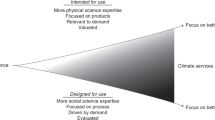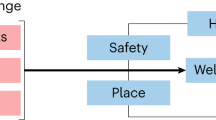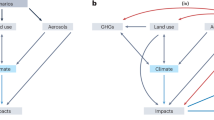Abstract
Climate-change-related risks pose serious threats to the management of a wide range of social, economic and ecological systems. Managing these risks requires knowledge-intensive adaptive management and policy-making actively informed by scientific knowledge, especially climate science1. However, potentially useful climate information often goes unused1,2. This suggests a gap between what scientists understand as useful information and what users recognize as usable in their decision-making. We propose a dynamic conceptual model to address this gap and highlight strategies to move information from useful to usable to reduce climate-related risks.
This is a preview of subscription content, access via your institution
Access options
Subscribe to this journal
Receive 12 print issues and online access
$209.00 per year
only $17.42 per issue
Buy this article
- Purchase on Springer Link
- Instant access to full article PDF
Prices may be subject to local taxes which are calculated during checkout

Similar content being viewed by others
References
National Research Council America's Climate Choices: Panel on Advancing the Science of Climate Change (NRC, 2010).
National Research Council Informing Decisions in a Changing Climate — Panel on Strategies and Methods for Climate-Related Decision Support (NRC, 2009).
Rockstrom, J. et al. A safe operating space for humanity. Nature 461, 472–475 (2009).
Sarewitz, D. World view: Tomorrow never knows. Nature 463, 24 (2010).
Lemos, M. C. & Rood, R. Climate projections and their impact on policy and practice. WIRes. Clim. Change 1, 670–682 (2010).
National Research Council Evaluating Progress of the U.S. Climate Change Science Program: Methods and Preliminary Results — Committee on Strategic Advice on the U.S. Climate Change Science Program (NRC, 2007).
Engle, N. L. Adaptation to Extreme Droughts in Arizona, Georgia, and South Carolina: Evaluating Adaptive Capacity and Innovative Planning and Management Approaches for States and Their Community Water Systems PhD thesis, Univ. of Michigan (2010).
Kirchhoff, C. J. Integrating Science and Policy: Climate Change Assessments and Water Resources Management PhD thesis, Univ. Michigan (2010).
Stokes, D. E. Pasteur's Quadrant: Basic Science And Technological Innovation (Brookings Institution, 1997).
Dilling, L. & Lemos, M. C. Creating usable science: Opportunities and constraints for climate knowledge use and their implications for science policy. Global Environ. Change 21, 680–689 (2011).
Lemos, M. C. & Morehouse, B. The co-production of science and policy in integrated climate assessments. Global Environ. Change 15, 57–68 (2005).
Cash, D. W., Borck, J. C. & Patt, A. G. Countering the loading-dock approach to linking science and decision making. Comparative analysis of El Niño/Southern Oscillation (ENSO) Forecasting systems. Sci. Technol. Hum. Val. 31, 465–494 (2006).
McNie, E. C. Reconciling the supply of scientific information with user demands: An analysis of the problem and review of the literature. Environ. Sci.Policy 10, 17–38 (2007).
Jasanoff, S. & Wynne, B. in Human Choice and Climate Change: The Societal Framework Vol. 1 (eds Rayner, S. & Malone, E. L) 1–88 (Batelle, 1998).
Buizer, J., Jacobs, K. & Cash, D. Making short-term climate forecasts useful: Linking science and Action. Proc.Natl Acad. Sci. USA http://dx.doi.org/10.1073/pnas.0900518107 (2010).
Jacobs, K. et al. Linking knowledge with action in the pursuit of sustainable water-resources management. Proc.Natl Acad. Sci. USA http://dx.doi.org/10.1073/pnas.0813125107 (2010).
Van Kerkhoff, L. & Lebel, L. linking knowledge and action for sustainable development. Annu. Rev. Env. Resour. 31, 445–477 (2006).
Feldman, D. L. & Ingram, H. M. Making science useful to decision makers: Climate Forecasts, water management and knowledge networks. Weather Clim. Soc. 1, 9–21 (2009).
Lowrey, J., Ray, A. & Webb, R. Factors influencing the use of climate information by Colorado municipal water managers. Climate Res. 40, 103–119 (2009).
Weber, E. U. Experience-based and description-based perceptions of long-term risk: Why global warming does not scare us (yet). Climatic Change 77, 103–120 (2006).
Patt, A. & Gwata, C. Effective seasonal climate forecast applications: Examining constraints for subsistence farmers in Zimbabwe. Global Environ. Change 12, 185–195 (2002).
Rice, J. L., Woodhouse, C. A. & Lukas, J. L. Science and decision making: Water management and tree-ring data in the western United States. J. Am. Water Resour. Assoc. 45, 1248–1259 (2009).
Callahan, B., Miles, E. & Fluharty, D. Policy implications of climate forecasts for water resources management in the Pacific Northwest. Policy Sci. 32, 269–293 (1999).
Corringham, T. W., Westerling, A. L. & Morehouse, B. J. Exploring use of climate information in wildland fire management: A decision calendar study. J. Forest. 106, 71–77 (2008).
Pulwarty, R. S. & Redmond, K. T. Climate and salmon restoration in the Columbia River Basin: The role and usability of seasonal forecasts. B. Am. Meteorol. Soc. 78, 381–396 (1997).
Cash, D. W. et al. Knowledge systems for sustainable development. Proc. Natl Acad. Sci. USA 100, 8086–8091 (2003).
Jacobs, K., Garfin, G. & Lenart, M. More than just talk: Connecting science and decision making. Environment 47, 6–21 (2005).
Meinke, H. et al. Adaptation science for agriculture and natural resource management— urgency and theoretical basis. Curr. Opin. Environ. Sustain. 1, 69–76 (2009).
Mearns, L. O. The drama of uncertainty. Climatic Change 100, 77–85 (2010).
Meyer, R. The public values failures of climate science in the US. Minerva 49, 47–70 (2011).
Adger, W. N., Huq, S., Brown, K., Conway, D. & Hulme, M. Adaptation to climate change in the developing world. Prog. Dev. Studies 3, 179–195 (2003).
Changnon, S. A. & Kunkel, K. E. Rapidly expanding uses of climate data and information in agriculture and water resources: Causes and characteristics of new applications. Bull. Am. Meteorol. Soc. 80, 821–830 (1999).
Pagano, T. C., Hartmann, H. C. & Sorooshian, S. Factors affecting seasonal forecast use in Arizona water management: A case study of the 1997–98 El Niño. Clim. Res. 21, 259–269 (2002).
Stern, P. & Easterling, W. E. Making Climate Forecasts Matter (National Academy, 1999).
Wilbanks, T. & Kates, R. W. Global change in local places: How scale matters. Climatic Change 43, 601–628 (1999).
Changnon, S. A. & Vonnahme, D. R. Impact of spring 2000 drought forecasts on Midwestern water management. J. Water Resour. Plan. Manag. 129, 18–25 (2003).
Orlove, B. S., Broad, K. & Petty, A. M. Factors that influence the use of climate forecasts — Evidence from the 1997/98 El Niño event in Peru. Bull. Am. Meteorol. Soc. 85, 1735–1743 (2004).
Power, S., Sadler, B. & Nicholls, N. The influence of climate science on water management in western Australia: Lessons for climate scientists. Bull. Am. Meteorol. Soc. 86, 839–844 (2005).
Snover, A. K., Hamlet, A. F. & November, D. P. L. Climate-change scenarios for water planning studies: Pilot applications in the Pacific Northwest. Bull. Am. Meteorol. Soc. 84, 1513–1518 (2003).
Lemos, M. C., Finan, T., Fox, R., Nelson, D. & Tucker, J. The Use of seasonal climate forecasting in policymaking: Lessons from Northeast Brazil. Climatic Change 55, 479–507 (2002).
Pagano, T. C., Hartmann, H. C. & Sorooshian, S. Using climate forecasts for water management. J. Am. Water Resour. Assoc. 37, 1139–1153 (2001).
Yarnal, B., Heasley, A. L., O'Connor, R. E., Dow, K. & Jocoy, C. L. The potential use of climate forecasts by community water system managers. Land Use Water Resour. Res. 6, 1–38 (2006).
Rayner, S., Lach, D. & Ingram, H. Weather forecasts are for wimps: Why water resource managers do not use climate forecasts. Climatic Change 69, 197–227 (2005).
Archer, E. R. M. Identifying underserved end-user groups in the provision of climate information. Bull. Am. Meteorol. Soc. 84, 1525–1532 (2003).
Ingram, K. T., Roncoli, C. & Kirshen, P. H. Opportunities and constraints for farmers of west Africa to use seasonal precipitation forecasts with Burkina Faso as a case study. Agr. Syst. 74, 331–349 (2002).
Meinke, H. et al. Actionable climate knowledge: From analysis to synthesis. Climate Res. 33, 101–110 (2008).
Nelson, R. A., Holzworth, D. P., Hammer, G. L. & Hayman, P. T. Infusing the use of seasonal climate forecasting into crop management practice in North East Australia using discussion support software. Agr. Syst. 74, 393–414 (2002).
Roncoli, C. Ethnographic and participatory approaches to research on farmers' responses to climate predictions. Climate Res. 33, 81–99 (2006).
Roncoli, C. et al. From accessing to assessing forecasts: An end-to-end study of participatory climate forecast dissemination in Burkina Faso (West Africa). Climatic Change 92, 433–460 (2009).
Ziervogel, G. & Calder, R. Climate variability and rural livelihoods: Assessing the impact of seasonal climate forecasts. Area 35, 403–417 (2003).
Lemos, M. C. & Dilling, L. Equity in forecasting climate: Can science save the world's poor? Sci. Publ. Pol. 34 (2007).
Van Kerkhoff, L. & Szlezák, N. A. The role of innovative global institutions in linking knowledge and action Proc.Natl Acad. Sci. USA http://dx.doi.org/10.1073/pnas.0900541107 (2010).
Morss, R., Wilhelmi, O., Downton, M. & Gruntfest, E. Flood risk, uncertainty and scientific information for decision making: Lessons from an interdisciplinary project. Bull. Am. Meteotol. Soc. 86, 1593–1601 (2005).
Beller-Simms, N. et al. Decision-Support Experiments and Evaluations Using Seasonal to Interannual Forecasts and Observational Data: A Focus on Water Resources (United States Climate Change Science Program, 2008).
Glantz, M. H. Consequences and responsibilities in drought forecasting: The Case of Yakima, 1977. Water Resour. Res. 18, 3–13 (1982).
Lemos, M. C. What influences innovation adoption by water managers? Climate information use in Brazil and the US. J. Am. Water Resour. Assoc. 44, 1388–1396 (2008).
Tarhule, A. & Lamb, P. J. Climate research and seasonal forecasting for West Africans: Perceptions, dissemination, and use. Bull. Am. Meteorol. Soc. 84, 1741–1759 (2003).
Broad, K., Pfaff, A. S. P. & Glantz, M. H. Effective and equitable dissemination of seasonal-to-interannual climate forecasts: Policy implications from the peruvian fishery during El Niño 1997–98. Climatic Change 54, 415–438 (2002).
Carbone, G. J. & Dow, K. Water resources and drought forecasts in South Carolina. J. Am. Water Resour. Assoc. 41, 145–155 (2005).
O'Connor, R. E., Yarnal, B., Dow, K., Jocoy, C. L. & Carbonne, G. J. Feeling at risk matters: Water managers and the decision to use forecasts. Risk Anal. 5, 1265–1275 (2005).
Ropelewski, C. F. & Lyon, B. in Global Climate: Current Research And Uncertainties In The Climate System (eds Rodó, X. & Comín, F. A) Ch. 4, 41–54 (Springer, 2003).
Hedger, M., Connell, R. & Bramwell, P. Bridging the gap: Empowering decision-making for adaptation through the UK Climate Impacts Programme. Clim. Policy 6, 201–215 (2006).
Ray, A. J. et al. Applications of monsoon research: Opportunities to inform decision making and reduce regional vulnerability. J. Climate 20, 1608–1627 (2007).
Changnon, S. A. Changing uses of climate predictions in agriculture: Implications for prediction research, providers, and users. Weather Forecast 19, 606–613 (2004).
Cobon, D., Bell, K., Park, J. & Keogh, D. Summative evaluation of climate application activities with pastoralists in western Queensland. Rangeland J. 30, 361–374 (2008).
White, D. D. et al. Credibility, salience, and legitimacy of boundary objects: Water managers' assessment of a simulation model in an immersive decision theater. Sci. Publ. Policy 37, 219–232 (2010).
Nonaka, I. A dynamic theory of organizational knowledge creation. Organ. Sci. 5, 14–37 (1994).
Lemos, M. C. A Tale of two policies: The politics of seasonal climate forecast use in Ceará, Brazil. Policy Sci. 32, 101–123 (2003).
Marx, S. M. et al. Communication and mental processes: Experiential and analytic processing of uncertain climate information. Global Environ. Change 17, 47–58 (2007).
Hartmann, H. C., Pagano, T. C., Sorooshian, S. & Bales, R. Confidence builders: Evaluating seasonal climate forecasts from user perspectives. Bull. Am. Meteorol. Soc. 8, 683–698 (2002).
Guston, D. H. Boundary organizations in environmental policy and science: An introduction. Sci. Technol. Hum. Val. 26, 399–408 (2001).
Sarewitz, D. & Pielke, R. A. Jr The neglected heart of science policy: Reconciling supply of and demand for science. Environ. Sci. Policy 10, 5–16 (2007).
Beyer, J. M. & Trice, H. M. The utilization process — a conceptual framework and synthesis of empirical findings. Admin. Sci. Quart. 27, 591–622 (1982).
Lundvall, B. A., Johnson, B., Andersen, E. S. & Dalum, B. National systems of production, innovation and competence building. Res. Policy 31, 213–231 (2002).
Kline, S. J. & Rosenberg, N. in The Positive Sum Strategy: Harnessing Technology for Economic Growth (ed Rosenberg, N. & Landau, R.) 275–305 (National Academy, 1986).
Prahalad, C. K. & Ramaswamy, V. Co-creation experiences: The next practice in value creation. J. Interact. Mark. 18, 5–14 (2004).
Taylor, R. S. Value-added processes in the information life-cycle. J. Am. Soc. Inf. Sci. 33, 341–346 (1982).
Von Hippel, E. & Katz, R. Shifting innovation to users via toolkits. Manage. Sci. 48, 821–833 (2002).
Department of Primary Industries DPI Services to farm foresters (2011); available via http://go.nature.com/1IEZUO
Goddard, L. et al. Providing seasonal-to-interannual climate information for risk management and decision-making. Procedia Environ. Sci. 1, 81–101 (2010).
Author information
Authors and Affiliations
Contributions
All authors contributed extensively to the work presented in this paper.
Corresponding author
Ethics declarations
Competing interests
The authors declare no competing financial interests.
Supplementary information
Supplementary Information
Supplementary Information (PDF 231 kb)
Rights and permissions
About this article
Cite this article
Lemos, M., Kirchhoff, C. & Ramprasad, V. Narrowing the climate information usability gap. Nature Clim Change 2, 789–794 (2012). https://doi.org/10.1038/nclimate1614
Received:
Accepted:
Published:
Issue Date:
DOI: https://doi.org/10.1038/nclimate1614
This article is cited by
-
How to bridge the last mile in agro-climate service adoption? The importance of farmers’ needs, attitudes and interpersonal relations in understanding impact pathways
Environment, Development and Sustainability (2024)
-
An analysis of the barriers to using climate information services to build a resilient agricultural system in Iran
Natural Hazards (2024)
-
Pathways from research to sustainable development: Insights from ten research projects in sustainability and resilience
Ambio (2024)
-
Climate action post-Paris: how can the IPCC stay relevant?
npj Climate Action (2023)
-
New insights into projected Arctic sea road: operational risks, economic values, and policy implications
Climatic Change (2023)



